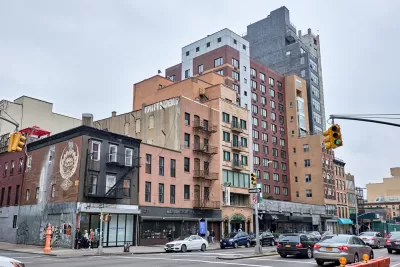A new paper published by the Joint Center for Housing Studies of Harvard University raises the stakes of the discussion about exclusionary zoning and its role in the ongoing housing affordability crisis in the United States.

Michael Stegman explains new writing on the subject of exclusionary zoning that makes an argument for overturning the dominant practice of 20th century zoning as the civil rights issue of the current era.
Stegman notes that he recent formation of the White House Council on Eliminating Regulatory Barriers to Affordable Housing is only the most recent version of a recurring series of political efforts at the federal level, consistent despite political party in recent adminsitrations:
Though their respective contexts may vary according to the political economy of the time, their centers of gravity are strikingly similar. Each is based on the proposition that unnecessary and exclusionary land use regulations drive up production costs and drive down housing supply, worsening an already severe affordability crisis…
Stegman also notes that previous efforts to reform exclusionary zoning have resulted in more talk than action. Stegman's new "Industry Perspectives" paper argues that the reason for the failure to reform local zoning practices is caused by underestimating the national implications of status quo.
The paper, titled "Eliminating Exclusionary Land Use Regulations Should Be the Civil Rights Issue of Our Time," therefore cites "several recent state and local zoning reforms that have the potential to make significant local impacts." Still, those local efforts reflect only a patchwork, and "focusing exclusively on isolated local reforms fails to recognize that the collective impact of decades of layering exclusionary zoning and land use controls is not just higher housing prices."
Instead of these local reforms, Stregman suggests the federal government should treat exclusionary zoning like a national problem, even suggesting constitutional means.
FULL STORY: ELIMINATING EXCLUSIONARY LAND USE REGULATIONS SHOULD BE THE CIVIL RIGHTS ISSUE OF OUR TIME

Planetizen Federal Action Tracker
A weekly monitor of how Trump’s orders and actions are impacting planners and planning in America.

Maui's Vacation Rental Debate Turns Ugly
Verbal attacks, misinformation campaigns and fistfights plague a high-stakes debate to convert thousands of vacation rentals into long-term housing.

San Francisco Suspends Traffic Calming Amidst Record Deaths
Citing “a challenging fiscal landscape,” the city will cease the program on the heels of 42 traffic deaths, including 24 pedestrians.

Amtrak Rolls Out New Orleans to Alabama “Mardi Gras” Train
The new service will operate morning and evening departures between Mobile and New Orleans.

The Subversive Car-Free Guide to Trump's Great American Road Trip
Car-free ways to access Chicagoland’s best tourist attractions.

San Antonio and Austin are Fusing Into one Massive Megaregion
The region spanning the two central Texas cities is growing fast, posing challenges for local infrastructure and water supplies.
Urban Design for Planners 1: Software Tools
This six-course series explores essential urban design concepts using open source software and equips planners with the tools they need to participate fully in the urban design process.
Planning for Universal Design
Learn the tools for implementing Universal Design in planning regulations.
Heyer Gruel & Associates PA
JM Goldson LLC
Custer County Colorado
City of Camden Redevelopment Agency
City of Astoria
Transportation Research & Education Center (TREC) at Portland State University
Jefferson Parish Government
Camden Redevelopment Agency
City of Claremont





























